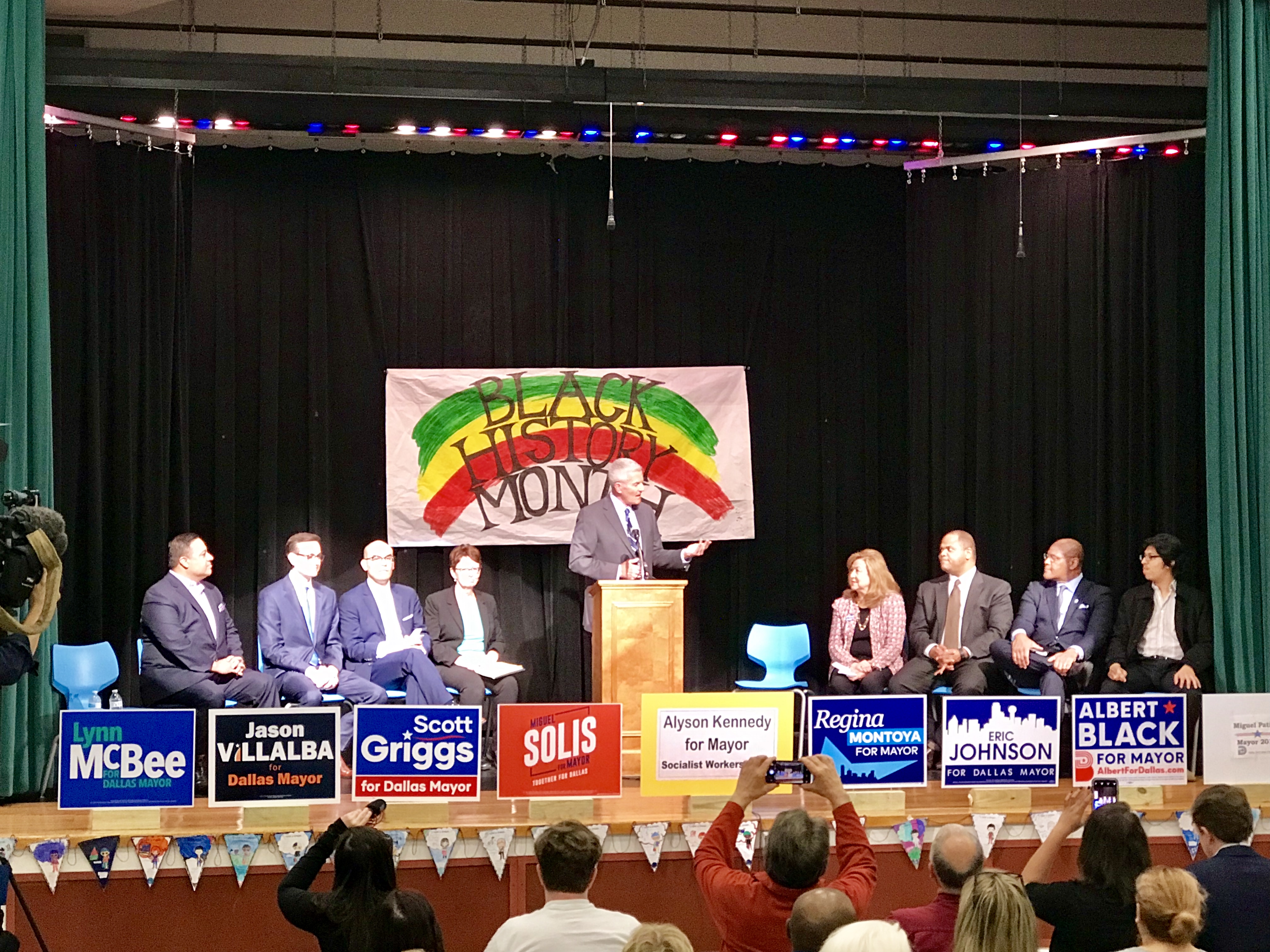Tuesday night, almost all of the candidates for Dallas mayor graced the stage at Edna Rowe Elementary, in far East Dallas. Design District developer Mike Ablon was the lone no-show. Lynn McBee, a philanthropist and CEO of the Young Women’s Preparatory Network, showed up a little late—hence the empty seat in the photo above—but she made it by question No. 2. NBC DFW’s Ken Kalthoff moderated, meaning this was the first mayoral forum of the current race where a real journalist asked the questions. Developer Lucy Billingsley, who has endorsed McBee, moderated last week’s.
You can read more about all these candidates here, by the way, and vote in the first week of our weekly poll here. Here is coverage from the last candidate debate. Below are some notes from Tuesday’s forum.
Albert Black came out swinging. Just about everyone on stage took heat from Black, the Oak Cliff businessman who once chaired the Dallas Housing Authority. He started with a jab at current State Rep. Eric Johnson, whom he spoke directly after: “We’ve had Johnson say, ‘Hire a person that can do the job,’” Black said. “You start with a person that doesn’t have two jobs in the first place.”
North Oak Cliff Councilman Scott Griggs drew his ire next, with a jab about poor representation at the city level. Black later targeted Dallas ISD Trustee Miguel Solis and former State Rep. Jason Villalba by broadly criticizing the city, school district, and state. But the most telling comment of his willingness to mix it up came in a response about the mayor’s role in education, after just about everyone before him had expressed various ways they’d like to use the office to boost the Dallas Independent School District.
“The mayor needs to respect the independent jurisdiction of Dallas public schools and mind their own business,” Black said.
There’s a Griggs complex. You can make a few arguments about who the front runner of this cluttered pack is, but it appeared clear on Tuesday who the candidates consider atop the ballot. Griggs was the recipient of both subtle and obvious jabs. There were Black’s comments. And then there was Villalba, who made a play on Griggs’ “new kind of mayor” tagline while talking about funding for police: “A new kind of mayor would have taken care of this when they were on Council,” he said. You’ll recall that Villalba was the candidate who called on Griggs to exit the race after it was revealed he had accepted campaign donations from young children.
A couple of early questions from the community gave a glimpse at candidates’ priorities. Kalthoff’s first two questions came from community members in far East Dallas. They asked about a community center they’ve been waiting on at Highland and Ferguson roads as well as increasing funding for libraries. Nobody was going to express anything but support for those initiatives, and the questions offered a chance for candidates to flex their community bonafides. But that could all be wrapped up in about 15 seconds, and the candidates were allotted 90 per question. You learned a bit more about their priorities after they said their peace and moved on.
You had Villalba and Johnson spinning into talk about economic development and budget realities. “We have to compete with other cities that are also looking to bring these high-wage jobs to our city to bring the revenues we need—without raising taxes—to provide for these kinds of programming,” Villalba said. Added Johnson: “If you want to have more libraries, you’re going to have to expand the pie, grow the economy. … Or, you have to redirect resources from one initiative to another. And that’s something for the voters to decide.”
Griggs touched on economic development in a different way by saying the city should require companies looking to relocate here to promise wages of at least $15 an hour, and that those wages go to Dallas residents. He said the same thing at last week’s forum. He distanced himself from past taxpayer expenditures that, he says, didn’t represent what the city needed and could be spent elsewhere: “We’ve already put up the big fancy bridges, the convention center hotel. We tried to build a white water rapid that didn’t work,” he said. (Side note: The library question is also where Black shot at Griggs about poor city representation.)
Regina Montoya, a corporate attorney and previous general counsel for Children’s Medical Center, laid the foundation for what became a touchpoint she returned to several times. She pushed her experience chairing the Mayor’s Taskforce on Poverty, and argued that her boots-on-the-ground involvement prepared her to solve the city’s stark economic divide. We need “a mayor that understands the issues in front of her,” Montoya said. “A mayor that understands we need to bring all the entities together because we don’t have the resources at the city.”
And then you had Solis further pumping his approach as a listen-first leader. He has a plan to visit every neighborhood in Dallas this campaign season, which he touted when he got in the race. As mayor, Solis says, he’ll host office hours. “I’m coming to you, and I’m going to bring city code with me, and police with me, and fire with me, and other services as well,” he said. “We’re going to open up our office to you so that we can get these projects on our agenda and work with our Council to get these projects moving.”
Miguel Patino represented his generation well. Patino is 18 years old. He didn’t get the required 216 signatures for his application for mayor, so he’ll be a write-in candidate on May 4. But they let the young man on the panel, and he represented Gen Z well. He was earnest and he was funny.
Take his opening statement about why he’s running among a sea of powerful and well-known people, in which he proclaimed himself rich—“rich in character.”
Or his thoughts on police understaffing: “Someone tried to break into my house, I called the cops. It took them 40 minutes to show up. It took Pizza Hut only 20.”
Or his discussion of the mayor’s role in education, which included his admission that he just graduated from DISD last year, which he flipped into an advantage: “Everything is still fresh in my mind.”
The audience loved it. Patino’s responses were never self-serious, and he provided some nice levity to the evening.
Solis pounced on an opportunity to pay respect to police. Dallas has a police staffing problem. When the question came up about it, candidates generally said they wanted to boost force moral, increase pay, and improve benefits. And then it came time for Socialist Workers Party candidate Alyson Kennedy to speak. She proclaimed that police serve the purpose of keeping rich people rich. The cops exist to “keep us in our place, to keep us thinking we’re worthless,” Kennedy said. There were a handful of uniformed police standing in the back of the gym, and one of them exclaimed, “You’re so wrong, lady.” A few walked out.
Kennedy’s time ended, and Solis was next. He struck the right note for the room: “I’d like everybody to do me a favor just real quick. I’d like you to turn around and look at our officers, and I’d like you to give them a round of applause.”
Campaign finance got a question, and somehow Griggs escaped criticism. Kalthoff’s last question revolved around the way our campaign finance system is set up. Given how the rest of the evening had gone, it was fair to expect somebody to tee off on Griggs, who found himself in hot water in late January and early February for accepting campaign donations from children during previous election cycles. As mentioned above, Villalba suggested the revelation “disqualifies [Griggs] from public service.”
But on Tuesday, most people instead focused on the caps on donations. In a mayor’s race, an individual cannot give more than $5,000 to any one candidate. That means “no one can run away from the race and just write big checks,” says McBee, the former Highland Park resident whose list of endorsers include car dealership owner Clay Cooley, aforementioned developer Lucy Billingsley, former Mary Kay CEO Richard Rogers, and other well-to-do Dallasites.
Eric Johnson touched on something we’ve been talking about here in the D Magazine office. When it comes down to it, other than the general public, no one is holding candidates accountable for ethics violations. Corbett Smith had a piece in today’s Morning News about this very topic . “We put the burden on the citizen to find the violations and then we put the burden on the citizens to prove up the violations,” he said. “You have to push that stone uphill constantly to have anything done on our ethics laws. … It’s designed to protect the elected officials, and that needs to change.”





